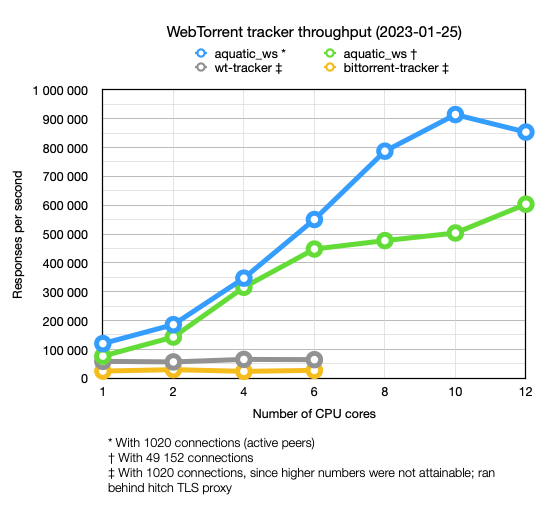# aquatic_ws: high-performance open WebTorrent tracker [](https://github.com/greatest-ape/aquatic/actions/workflows/ci.yml) High-performance WebTorrent tracker for Linux 5.8 or later. Features at a glance: - Multithreaded design for handling large amounts of traffic - All data is stored in-memory (no database needed) - IPv4 and IPv6 support - Supports forbidding/allowing info hashes - Prometheus metrics - Automated CI testing of full file transfers Known users: - [tracker.webtorrent.dev](https://tracker.webtorrent.dev) (`wss://tracker.webtorrent.dev`) ## Performance  More details are available [here](../../documents/aquatic-ws-load-test-2023-01-25.pdf). ## Usage ### Compiling - Install Rust with [rustup](https://rustup.rs/) (latest stable release is recommended) - Install build dependencies with your package manager (e.g., `apt-get install cmake build-essential`) - Clone this git repository and build the application: ```sh git clone https://github.com/greatest-ape/aquatic.git && cd aquatic # Recommended: tell Rust to enable support for all SIMD extensions present on # current CPU except for those relating to AVX-512. (If you run a processor # that doesn't clock down when using AVX-512, you can enable those instructions # too.) . ./scripts/env-native-cpu-without-avx-512 cargo build --release -p aquatic_ws ``` ### Configuring Generate the configuration file: ```sh ./target/release/aquatic_ws -p > "aquatic-ws-config.toml" ``` Make necessary adjustments to the file. You will likely want to adjust `address` (listening address) under the `network` section. To run over TLS, configure certificate and private key files. Running behind a reverse proxy is supported, as long as IPv4 requests are proxied to IPv4 requests, and IPv6 requests to IPv6 requests. ### Running Make sure locked memory limits are sufficient: - If you're using a systemd service file, add `LimitMEMLOCK=65536000` to it - If you're using openrc, make sure you have `rc_ulimit='-l 65536'` in your init script - Otherwise, add the following lines to `/etc/security/limits.conf`, and then log out and back in: ``` * hard memlock 65536 * soft memlock 65536 ``` In Alpine Linux you will likely need a [higher limit](https://github.com/greatest-ape/aquatic/issues/211). Once done, start the application: ```sh ./target/release/aquatic_ws -c "aquatic-ws-config.toml" ``` If your server is pointed to by domain `example.com` and you configured the tracker to run on port 3000, people can now use it by adding the URL `wss://example.com:3000` to their torrent files or magnet links. ### Load testing A load test application is available. It supports generation and loading of configuration files in a similar manner to the tracker application. After starting the tracker, run the load tester: ```sh . ./scripts/env-native-cpu-without-avx-512 # Optional cargo run --release -p aquatic_ws_load_test -- --help ``` ## Details Aims for compatibility with [WebTorrent](https://github.com/webtorrent) clients. Notes: * Doesn't track the number of torrent downloads (0 is always sent). * Doesn't allow full scrapes, i.e. of all registered info hashes `aquatic_ws` has not been tested as much as `aquatic_udp`, but likely works fine in production. ## Architectural overview  ## Copyright and license Copyright (c) Joakim Frostegård Distributed under the terms of the Apache License, Version 2.0. Please refer to the `LICENSE` file in the repository root directory for details.